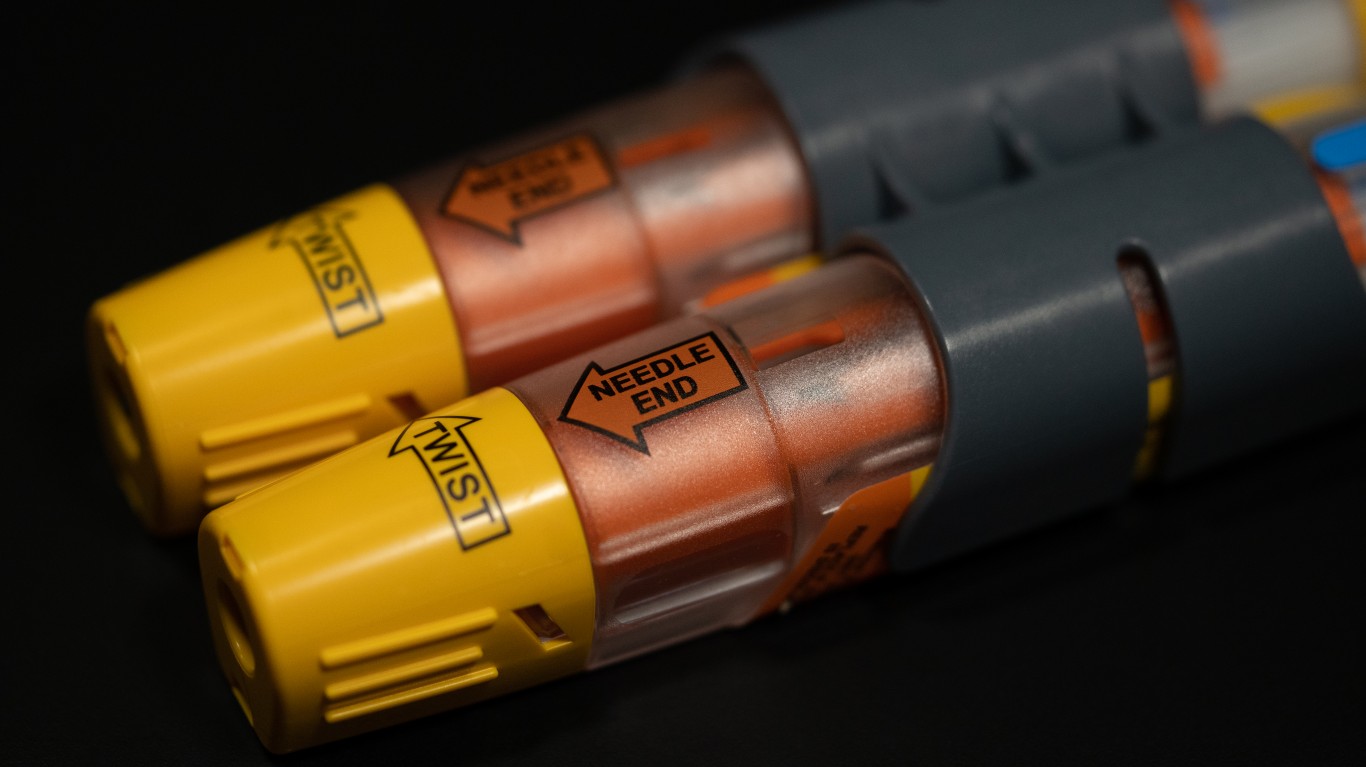Health and Healthcare
Will Teva Stock Collapse Before It Fixes Its Problems?

Published:

Teva Pharmaceuticals Industries Ltd. (NASDAQ: TEVA), the generic drug company, was founded in 1901 in Israel. It has become one of the largest pharmaceutical companies in the world.
Teva recently has been under fire for its role in the opioid crisis and pricing fixing of some drugs, often at many times their market value. In some cases, the price inflation was alleged to have been set at over 1,000%.
Over the past five years, Teva’s share price is down 83%, while the S&P 500 is higher by 63%.
Teva describes itself as a company in the vanguard of its industry. It claims to have over 3,500 products that “help” 200 million people in 60 countries every day. It is not clear where those numbers come from.
First among its offerings is Copaxone, one of the world’s best-selling multiple sclerosis drugs. It also holds a large position in drugs that treat central nervous systems problems.
The list of Teva’s deepest problems is very long.
In 2016, Teva and Mylan were accused of artificially increasing prices of an antibiotic and a diabetes drug. A suit was filed by 20 states. At the time, George C. Jepsen, Connecticut’s attorney general, told The New York Times, “We believe that this is just the tip of the iceberg. I stress that our investigation is continuing, and it goes way beyond the two drugs in this lawsuit, and it involves many more companies than are in this lawsuit.”
Last year, Teva was among 20 companies alleged to have fixed drug prices. The accusation said that the increases were as much as 1,000%. Charges were brought by 44 states.
Teva’s reaction was muted: “The allegations in this new complaint, and in the litigation more generally, are just that — allegations. Teva continues to review the issue internally and has not engaged in any conduct that would lead to civil or criminal liability.”
And, perhaps most difficult, Teva has been a major player in the opioid crisis. Its exposure is unlikely to be in its final stages. When Johnson & Johnson was on trial in Oklahoma, Teva elected to settle its case with the state for $85 million.
The reason for such a high figure is the number of deaths caused by the drugs. Charges from other states are pending. Ironically, Teva says one of its core values is that it holds itself accountable for its actions and the results of its behavior.
Teva and several other companies have continued to try to settle outstanding charges.
The opioid charges have hurt Teva in several ways. A comprehensive review by Moody’s that is part of its periodic review of ratings showed that Teva’s rating would stay at a very low Ba2. That grade is considered “speculative.”
Moody’s also reported that its outlook was negative. According to the firm, “The negative outlook reflects Moody’s concern over Teva’s persistently high leverage and large refinancing needs in light of its rising exposure to opioid-related litigation.”
Revenue has slid sharply over the past several years. It was $22 billion in 2016 and down to $19 billion in 2018. The most recent trailing 12 months figure is $17.5 billion. The company’s annual net income has been negative for almost three years.
Free cash flow was $2.63 billion in 2017. The number was $1.8 billion in 2018. It was barely breakeven for the past 12 months.
Revenues in the third quarter of 2019, the most recently reported, were $4.3 million, down 6% compared to the same quarter of 2018. Its net loss was $314 million for the period, compared to net loss of $273 million in the third quarter of 2018.
Teva is in the midst of a restructuring program meant to save it huge sums each year. This will be critical to any turnaround.
When Teva released its third-quarter figures, Kåre Schultz, Teva’s president and CEO, commented, “We remain on track to achieve our two-year restructuring target of a $3 billion spend base reduction.
More recently, Teva released its fourth-quarter financials. The pharma giant said that it had $0.53 in earnings per share (EPS) and $4.56 billion in revenue. That compared with consensus estimates of $0.54 in EPS and $4.52 billion in revenue. In the same period of the prior year, Teva said it had EPS of $0.93 on $5.46 billion in revenue.
Teva may be coming out of its nosedive. A JPMorgan analyst recently upgraded the stock.
Cost reductions won’t be enough if Teva cannot shed its multiple problems. The stock price cannot recover either.
Start by taking a quick retirement quiz from SmartAsset that will match you with up to 3 financial advisors that serve your area and beyond in 5 minutes, or less.
Each advisor has been vetted by SmartAsset and is held to a fiduciary standard to act in your best interests.
Here’s how it works:
1. Answer SmartAsset advisor match quiz
2. Review your pre-screened matches at your leisure. Check out the advisors’ profiles.
3. Speak with advisors at no cost to you. Have an introductory call on the phone or introduction in person and choose whom to work with in the future
Get started right here.
Thank you for reading! Have some feedback for us?
Contact the 24/7 Wall St. editorial team.